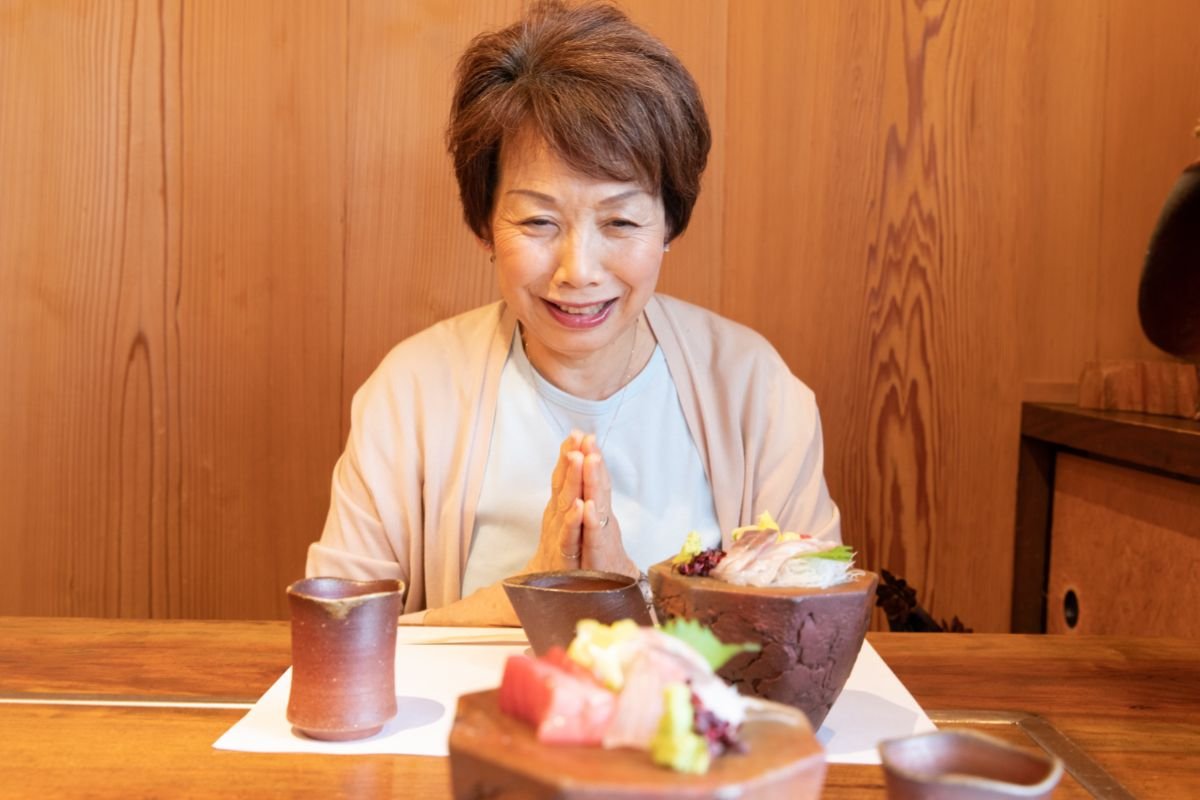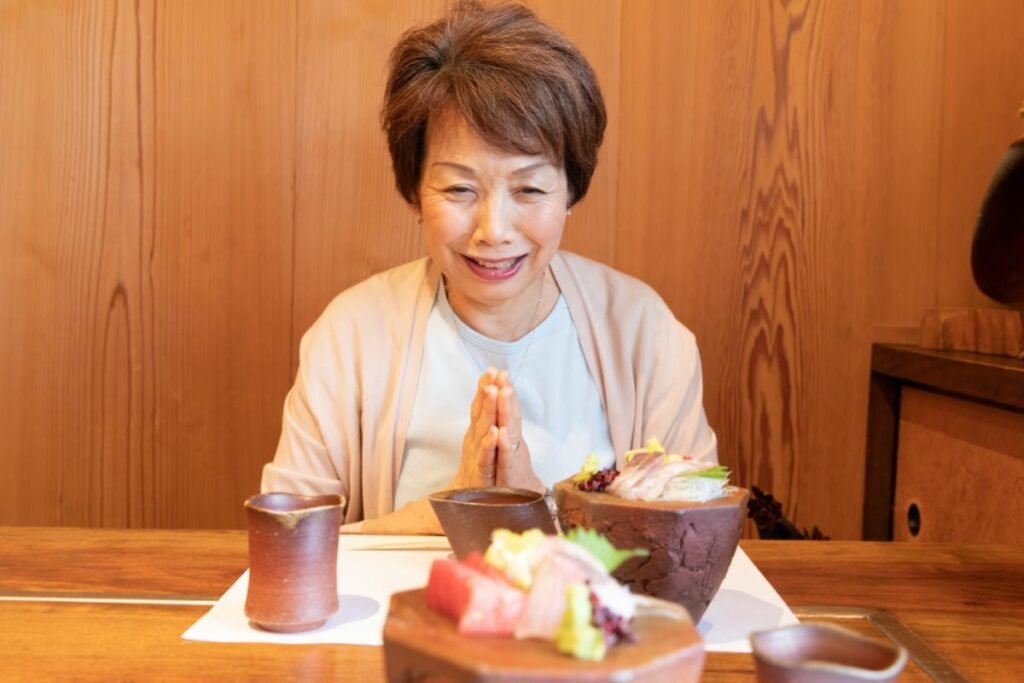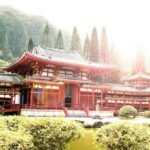Food is an integral part of Japanese culture, and it is extremely important to citizens that they preserve their traditional cuisine.

Mealtimes aren’t just about replenishing the body’s energy supply – they are also seen as an opportunity to uphold their cultural heritage and pass it on to future generations.
Visitors to the country are often taken aback by the emphasis that is placed on food there, and the high esteem in which it is held by the Japanese people.
Individual foods carry their own meaning, and can symbolize circumstances such as wealth, health and happiness.
Each type of meal also comes with its own etiquette and rules, whether you’re dining on sushi, noodles, or anything else, so it’s a good idea to familiarize yourself with what’s expected of you.
This can help you show your respect to the people and their culture, because you have taken the time to learn about them (see also ‘What Not To Do In Japan‘).
Along with this commitment to their cuisine comes a special phrase that they say before each meal. As they say this, they clasp their hands together in front of their body, as if in prayer.
This makes it similar to saying ‘grace’ in Western culture, except it doesn’t carry the same religious connotation. The word is ‘itadakimasu’, and we will explore its meaning and significance below.
What Does Itadakimasu Mean?
Itadakimasu translates to ‘I receive this meal’ in Japanese. It is made up of the verb ‘itadaku’, which is a polite alternative to the lesser verb ‘morau’; both mean to eat and receive.
You would say the phrase to the person who prepared the meal, so you are basically acknowledging the effort that went into the food and setting yourself in a more humble position.
This is because the food is always treated with care during and after its preparation, and cooks always take pride in their work.
Itadakimasu comes from a kanji character that means ‘top of the head’.
This is because, when you receive something from someone who is of a higher social rank than you, you position yourself in a specific way: kneel down, bow your head and lift your arms towards them.
In this case, it shows that you have elevated the cook to a higher standing in your eyes, and humbled yourself in front of them. It is a way of relaying your gratitude to that person for going out of their way to provide for you.
Unlike in some other cultures, saying a phrase before you eat in Japan isn’t necessarily a religious practice (see also, ‘What Do You Say Before Eating in Japan?‘). You are not thanking a god for the food, you are thanking the people whose labor and diligence have brought it to you.
This includes the cook, but also everyone further back in the process; from the farmers who grew the ingredients, to the shopkeepers who sold them.
In a way, it does also include the gods, who played a role in allowing the crops to prosper in the first place (depending on what you believe). However, it is not addressed specifically to a god, but to the wider audience of anyone involved in the production of the meal.
What Does Douzo Meshiagare Mean?
Once the guests or diners have said itadakimasu, the cook will then respond, ‘douzo meshiagare’. This invites the guests to begin eating, and means the same thing as ‘bon appetit’ in French.
There isn’t really an English equivalent in terms of a common saying, but it can essentially be translated as ‘please enjoy your meal’. Whoever prepared your meal wants you to taste what they have made, so they are encouraging you to do so.
There are several variants of this phrase, which are usually said in different settings. In a relaxed restaurant, a waiter may simply say ‘douzo’, which basically means ‘please’ or ‘go ahead!’.
If you are at a dinner party and you know the host well, they might say this, because it is quite an informal version.
A less colloquial phrase is ‘dozo, omeshi agari kudasai’, which also translates to ‘please enjoy your meal’. You will hear this at formal restaurants or among strangers, because it is the keigo (respectful Japanese) way of expressing your hospitality.
As you can see, the host’s response isn’t as set in stone as the phrase preceding it, which is always ‘itadakimasu’. They may even say something like ‘tabemasu’ (let’s eat’, or simply ‘tabete’ (‘eat!), if it is a particularly casual setting, such as among friends or at a family dinner.
This shows that giving thanks for the food is the most crucial part for Japanese people – they are grateful that they are being given resources to sustain themselves, so must acknowledge that gratitude.
What Do You Say After A Meal?
Once the meal is over, you would say ‘gochisousama desu’, which is essentially giving thanks once again.
Unlike in certain cultures, it is polite in Japan to finish your whole plate of food, because it shows respect to those who have made sacrifices to provide for you in the first place.
Just like with ‘itadakimasu’, this not only refers to whomever cooked it, but also to all involved, including the animals whose meat you have consumed. If you don’t say ‘gochisousama’ in some form, or finish your meal completely, you run the risk of looking impolite.
Why Are There So Many Greetings in Japan?
Japan is known for being one of the most polite countries in the world, where respect and etiquette are very important aspects of the culture. This may seem strange to outsiders, because of how strict everything is, but to the Japanese it is considered the norm.
If you visit, try to be aware of these social conventions and show respect to the locals – even a small gesture like bowing to greet people will be well-received.
Conclusion
The most important word to the Japanese before they begin eating is ‘itadakimasu’, and this is said at the start of every meal.
Once they have said this and given thanks for the food, diners will wait for the most senior-ranking person at the table to tuck in before they do, as this is also considered polite.
Expressing gratitude for the food is a very personal thing and not necessarily a social one, as some people will say it even when they are dining alone – they are acknowledging to themselves that many different parties have been involved in the production of their meal.
It all comes down to the way food is revered in Japan, so everyone must treat it with a high level of respect.
- What Is a Maiko? - July 13, 2025
- What Does Domo Arigato Mean? - July 12, 2025
- What Does Naruto Mean? - July 12, 2025









